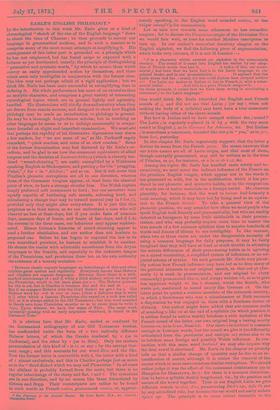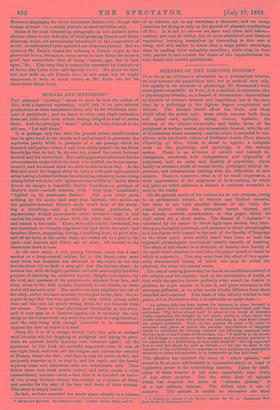EARLE'S ENGLISH PHILOLOGY.* IN the introduction to this work Mr.
Earle gives us a kind of chronological " sketch of the rise of the English language " down to about the time of Chaucer ; he then proceeds to survey our language in grammatical sections, and in such a manner as to comprise many of the most recent attempts at amplifying it. His arrangement of this latter part is grounded on a principle which he has not originated, but has found scope to expound with a fullness as yet desiderated, namely, the principle of distinguishing "presentive and symbolic words," by which he means those which convey an easily apprehended notion by themselves, and those which seem only intelligible in conjunction with the former class. The idea may not perhaps admit of a rigid application ; but we think Mr. Earle has been more successful in exemplifying than in defining it. His whole performance has more of an excursive than an analytic character, and comprises a great variety of interesting etymological topics which are in general lightly and agreeably handled. His illustrations will chiefly demand scrutiny when they are drawn from remote sources, and designed to show how English philology may be made an introduction to philology in general. He may be a thorough Anglo-Saxon scholar, but in touching on other languages he seems to us to indulge occasionally in conjec- tures founded on slight and imperfect examination. We must add that perhaps the rapidity of his illustrative digressions may alarm a few readers, for "we are some of us," as Mr. Pecksniff sagely remarked, "quick coaches, and some of us slow coaches." Some of the former denomination may feel flattered by Mr. Earle's ex- ordium, and be glad to see how the consonant equivalents of allied
tongues and the doctrine of Lautverschiebung (which is cleverly ren- dered "sound-shunting") are easily exemplified by a Welshman speaking English in Shakespeare, and putting p for bin "pragging, Pistol," f for v " fidelieet ;" and so on. But it will occur that
Fluellen's phonetic corruptions are all in one direction, whereas those of the Germanic tongues appear, at least from the classical point of view, to have a strange circular bias. The Welsh captain simply preferred soft consonants to hard ; but our ancestors were equally capable of hardening soft sounds, softening hard, and
introducing a change that may be termed neutral (say in b for f), provided only they might alter everywhere. It is just this that perplexes us in their tastes, as we can understand a man who will
observe no fast or feast-days, but if you make fasts of common days, common days of feasts, and feasts of fast-days, and if I do the reverse in the three cases, our behaviour may appear sophisti- cated. Hence Grimm',. formulas of sound-shunting appear to need a further elucidation, and our author does not hesitate to propound one. Before he has begun to expound the law in its own accredited province, he hastens to establish it in another. He shunts the reader with admirable smoothness from the Aryan languages to the Semitic, and especially to the unknown tongue of the Phoenicians, and proclaims there too on his own authority the existence of a ternary mutation :—
"Between closely cognate languages an interchange of this sort often exhibits great system and regularity. Everybody knows that Hebrew and Chaldee are cognate languages. Between these there is a well- marked interchange of z and d while a third dialect, which we may call the Phcenician, would in the same place put a t. The Hebrew pronoun for this is zeh, but in Chaldee it becomes daa and den and di But if we compare Hebrew with the third dialect we get t for z. The Hebrew word for rock is zoor or tsoor, [what a Calcutta way to write it I] after which a famous Phcenician city seated on a rock was called Ziir, as it is always called in the Old Testament ; but this word sounded in Greek ears from Phcenician mouths so as to cause them to write it Wen, Tyrus, whence we have the name of Tyre. The same word, (probably) passing with an early migration westward, is found in the Dartmoor Tors."
It is obvious here that Mr. Earle, misled or confused by the Germanized orthography of our Old Testament version, has confounded under the form of z two radically different Hebrew letters, of which the Greeks rendered by z (as in Zacharias), and the other by s (as in Sion). Only the modern pronunciation of this kind of s is ts, or say z by the corrupt Ger- man usage ; and this accounts for our word Zion and the like. Now the former letter is convertible with d, the latter with a kind of t almost exclusively, and this in Chaldee perhaps just as much as in the " third dialect which we maicall Phoenician." In all cases the sibilant is probably formed from the mute, but there is no regular interchange of the sharp and flat, t and d. The mutations are in, one direction, and by no means like those formulated by Grimm and Bopp. Their counterparts are rather to be found in such words as French nation, pronounced nation, or, approxi- . The Philology of the English Tongue. By John Earle, MA., ac. Oxford Clarendon Press. mately speaking, in the English word sounded ;whim, or the vulgar inamegi'ely for immmediately.
Let us turn now towards some references to less recondite tongues ; for to discuss the Phcenician origin of the Devonian Tors- we would fain wait, at least for another Moabite inscription to
turn up. In our author's somewhat desultory chapter on the English alphabet, we find the following piece of argumentation, which looks very obscure, if it is not ill founded :-
"J is a character which entered our alphabet in the seventeenth century. The sound of it came into English far earlier by onr adop- tion of French words that had it A reflex of this, our conso- nantal j, has been that we have lent it to the Latin language in our
printed books, and in our pronunciation It appears that the
Latin never had the j sound, for how coidd Italia, have escaped without it ? The Latin ego makes in Italian to, but in French je, with a conso- nantal initial And this is a pure French outgrowth On these grounds, it seems that we have been wrong in attributing a consonant j to the Latin language."
One would think Mr. Earle identified the English and French sounds of j, and did not see that Latin j (or say i when not
making the body of a syllable) may have been a true consonant without having either of the above sounds.
But how is Italian said to have escaped without the j sound ?
The Latin j is regularly replaced in it by g with the very same sound as English ), as in Giovanni for Johannes, &c. But Italian j is sometimes a consonant, sounded like our y in " yea," as in jeri, from heri, yesterday.
In this chapter Mr. Earle ingeniously suggests that the letter derives its name from the French queue. He seems unaware that our letter-names are all of Latin origin, and that most of them, though corruptly pronounced, may still be written as in the time of Priscian, as qu, for instance, or a be ce de e ef, &c.
Among the topics Mr. Earle has handled more subtly and in- structively, we must count the indirect influence of the French on. the primitive English tongue, which appear not in the words it
has presented us with, but in the modification which it has pro- duced in our phonetic and syntactic habits, or in the composition of words out of native materials on a foreign model. He observes- plausibly, for instance, that the word to become had formerly a local meaning, which it may have lost,by being used as an equiva- lent to the French devenir. To take a general view of the•
phonetic question, we may consider how often we meet people who speak English both fluently and grammatically, but who are readily detected as foreigners by some little shibboleth in their pronun- ciation, and who may probably require more time to master the true sounds of a few common syllables than to acquire hundreds of words and dozens of idioms to use intelligibly. In like manner, when two or three races are under the disagreeable necessity of using a common language for daily purposes, it may be fairly imagined that they will have at least as much trouble in adjusting the minute differences of their pronouncing habits as in agreeing on a mixed vocabulary, a simplified system of inflexions, or an ad- justed scheme of syntax. On such grounds Mr. Earle very plausi-
bly notices how French influence may have led us to drop many of the guttural elements in our original speech, so that our gh (for- merly h) is sunk in pronunciation, and our original hw (very commonly) pronounced like w, and always written wh, so as to give less apparent weight to the h element, which the Scotch, who wrote quh, continued to sound nearly like German ch. On the latter point he quotes a curious anecdote of the sixteenth century,. in which a Scotchman who was a schoolmaster at Bath recounts
a disputation he was engaged in there with a Southern doctor of
divinity. Our author might have added that our common mode- of sounding u like ew at the end of a syllable (in which position it is seldom found in native words) betokens a rude imitation of the French sound of the letter, our own original long u having mostly become ou, as in house, from psis. Our short u in husband is common. enough in Teutonic words, but the sound we give it (so differently articulated from the provincial and antique oo) seems also to us. to betoken some foreign and possibly Welsh influence. In con- nection with this same word husband we may also inquire wby
the first vowel is shortened. Mr. Earle in his chapter on prosody tells us that a similar change of quantity may be due to an in-
tensification of accent, although it is rather the removal of the accent which in most cases occasions similar corruptions. We should rather judge it was the effect of the consonant combination (as in Hampton for Hametown, &c.); for there is a common disinclina- tion to have a syllable doubly lengthened, viz., by the position and nature of the vowel together. Thus in our English Latin we give different vowels to dixi, dico, pronouncing Dick's eye, dyke 0, not by any accredited rule, but because the ear would not easily endure dyke's eye. The principle is to some extent traceable in the
Romance languages, for dictus becomes in Italian detto, though this change of tonic i to e mostly prevails in short syllables only.
Some of the most interesting paragraphs in our author's intro- duction relate to the difficulty of distinguishing French and Saxon elements, which are anomalously introduced in the composition of words, or confounded by an ignorant use of special phrases. But we question Mr. Earle's reason for refusing a French origin to the provincial bonny, because it seems never to have borne the sense of good, but everywhere that of being " smart, gay, fair to look upon," &c. This very idea is constantly expressed by diminutives of bonus, like Latin belles and Spauish bonito. We grant we have not met with an old French bonet in this sense, but we might conjecture it with as much reason as Mr. Earle has for his theoretical Saxon bonig.



































 Previous page
Previous page